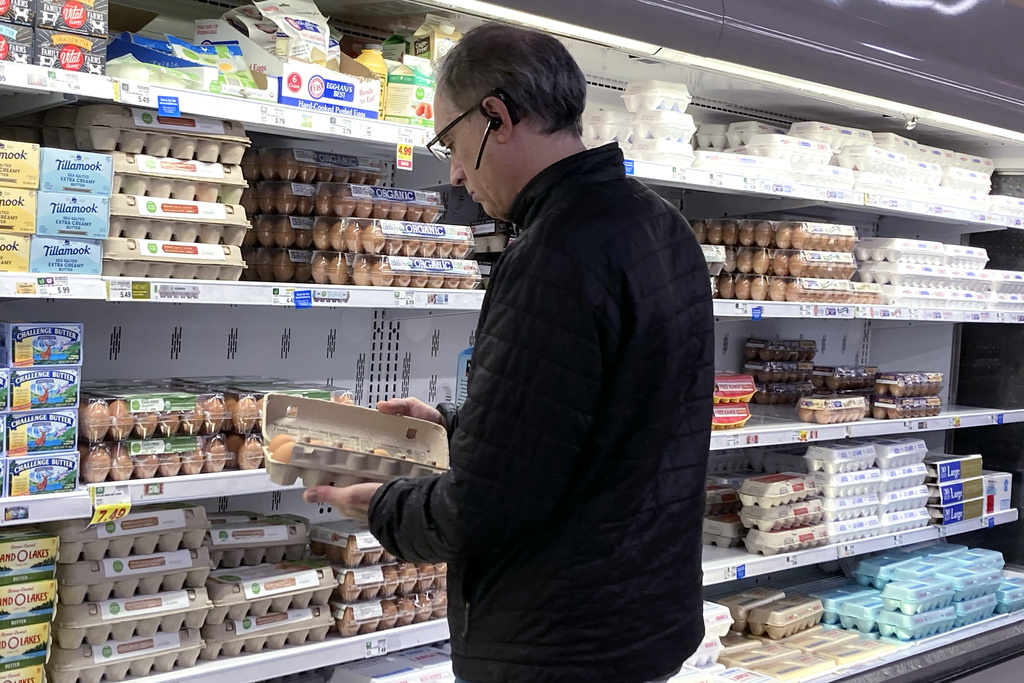U.S. inflation declined last month as the cost of gas, airline fares, and hotel rooms fell, a sign that price growth was cooling even as President Donald Trump ramped up his tariff threats.
Consumer prices rose just 2.4% in March from a year earlier, the Labor Department said Thursday, down from 2.8% in February. That is the lowest inflation figure since September.
Excluding the volatile food and energy categories, core prices rose 2.8% compared with a year ago, down from 3.1% in February. That is the smallest increase in core prices in nearly four years. Economists closely watch core prices because they are considered a better guide to where inflation is headed.
The report shows that inflation is mostly cooling, for now. Yet Trump’s huge tariffs on China and 10% universal duty are likely to push up prices in the coming months, economists say. The higher import taxes will likely weigh on the economy’s growth as well.
On a monthly basis, prices actually fell 0.1% in March, the first monthly drop in nearly five years. Core prices rose just 0.1% in March from February.
Used car prices dropped 0.7% from February to March, the government said. The cost of auto insurance fell 0.8%, welcome relief for car owners, though insurance costs are still up 7.5% compared with a year ago.
One reason prices fell was sharp drops in travel-related costs, including air fares, which slipped 5.3% just from February to March. Hotel room prices dropped 3.5%. Economists said those drops in part reflected much slower international demand as the number of tourists visiting the United States has fallen sharply amid Trump’s aggressive trade policy.
Visits to the United States from overseas fell nearly 12% last month, according to government data.
The cost of groceries, however, jumped 0.5% last month, the report showed, as egg prices leapt 5.9% to a new record average price of $6.23 a dozen. Clothing prices rose 0.4%, though they have increased little in the past year.
Trump had imposed sweeping tariffs on nearly 60 nations last week, which sent financial markets into a tailspin and caused sharp drops in business and consumer sentiment. Yet on Wednesday he paused those duties for 90 days. He kept a steep 125% tariff on all imports from China and 25% duties on steel, aluminum, imported cars, and many goods from China and Mexico.
The remaining tariffs are still likely to lift inflation this year, economists say, even with the 90-day pause.
Even with the pause, many companies are still uncertain where trade policy will go next. Trump has also said that duties on pharmaceutical imports will be imposed.
Consumers will likely see some prices rise because of the existing duties, including the massive tariffs on China. The United States imports more than $60 billion of iPhones and other mobile phones every year from China, as well as massive amounts of clothes, shoes and toys.
Many U.S. companies will likely shift production out of China, a process that had already started during Trump’s first term when he slapped duties on some of its exports. Still, China remains the Unite States’ third-largest trading partner.
Shifting supply chains out of China will also likely take time and come with its own costs, which could raise prices for U.S. consumers in the coming months.
Last week, Federal Reserve Chair Jerome Powell said that the central bank was likely to keep its key interest rate unchanged at about 4.3% as it waited to see how Trump’s policies impacted the economy. Trump called for the Fed to cut rates on Friday.
“There’s a lot of waiting and seeing going on, including by us,” Powell said. “And that just seems like the right thing to do in this period of uncertainty.”
(AP)











